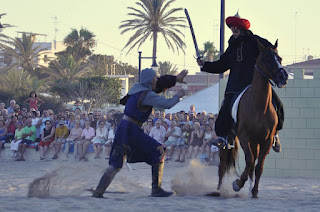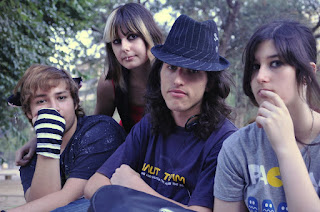 My fellow non-Texan intern, Beth, bagging kiwis to hand out at the mission
My fellow non-Texan intern, Beth, bagging kiwis to hand out at the mission Our typical assembly-line formation when we unload the trucks of food at the distribution center
Our typical assembly-line formation when we unload the trucks of food at the distribution center Mission Urbana owns a flat called La Casa de Acogida (The Welcome House) that houses six men--usually immigrants-- for a maximum of six months, while they look for a job and their own housing. While there, the men receive free food, housing, Spanish lessons, and Bible studies--if they so desire. We visited them briefly one morning, listened to their stories, and prayed with them. Here, the team is pictured with Frank, David, and Akim.
Mission Urbana owns a flat called La Casa de Acogida (The Welcome House) that houses six men--usually immigrants-- for a maximum of six months, while they look for a job and their own housing. While there, the men receive free food, housing, Spanish lessons, and Bible studies--if they so desire. We visited them briefly one morning, listened to their stories, and prayed with them. Here, the team is pictured with Frank, David, and Akim. One afternoon, Chema (left), a friend from church, invited a few of us to join him for some basketball at the park, where he often goes to meet people and build friendships.
One afternoon, Chema (left), a friend from church, invited a few of us to join him for some basketball at the park, where he often goes to meet people and build friendships.I played a couple games of basketball, but soon got distracted...
As promised, I'd also like to share with you all some of my insights and reflections from my time in Spain so far. Be forewarned: the following section is LOTS of text and no pictures.
WHAT WE'VE DONE
"La religión pura y sin mácula delante de Dios el Padre es esta: Vistiar a los huérfanos y a las viudas en sus tribulaciones, y guardarse sin mancha del mundo."As I prepare meals for hungry people; give them clean clothes; watch them file in for showers, shaves, and haircuts; give them a ration of groceries for the month, I often ask myself why we do what we do. How do these small acts of kindness advance the kingdom of God? Are we truly making a lasting impact? Personally, I just like to help other people out. But is it right to do it for the selfish motive of feeling good?
"Pure religion and undefiled before God and the Father is this, To visit the fatherless and widows in their affliction, and to keep himself unspotted from the world."
It all came together for me one afternoon as I was preparing an old widow's ration of food. She had walked a good distance on her own to our distribution center, with just a small duffel bag for her food. As I compiled her ration, it soon became clear that there was no way she could carry so much food on her own. So I talked to our manager, packed her duffel with a little of everything and told her to return the next day with some help for the rest of her food. When she returned the next afternoon, she was still alone. I asked her if anyone had come to help her carry the food home. She nearly broke down in tears as she covered her face and said, "Nadie...no hay nadie que puede ayudarme. Estoy sola...estoy sola." (No one...there is no one who can help me. I am alone...I am alone.) It was enough to break my heart, and it was then that I finally realized why the Scriptures mandate aiding widows. She was the embodiment of desolation. But even to lesser degrees, the people we serve are desolate. Most of them are in desperate situations of which we cannot even fathom. So with what the Lord has blessed us, we reach out to them in their affliction; and by our love and example, they will know we are Christ's.
SPIRITUAL MAPPING
Aside from our work at Mission Urbana, we've also attempted to reach out as much as we can to locals. It's difficult because we're not here long term, and it's been emphasized to us over and over again by local believers that evangelism in Spain lies in relationships of trust. Spaniards are friendly people but slow to trust. To enter their inner sanctum of friendship requires lots of time and commitment. This is typical of the postmodern society that Spain is and the United States is quickly becoming. For such a society, incarnational Christianity ("being Jesus") is proving to be the most effective means of communicating the gospel. Other methods of evangelism, such as dramas and street evangelism, serve as good attention-grabbers for the evangelical community, but in the end, it usually comes back to relationships of trust.
Thus, I have spent a good bit of time "people watching" and discussing with local believers the spiritual climate of this country. 1) Because of Franco's dictatorship and his affiliation with the Catholic church, the people of Spain are incredibly bitter toward church and organized religion. Their hearts are cold and hard because the older generation naturally resists change, while the younger generation doubts semblances of the past. 2) This obvious resistance toward faith has actually created in the minority evangelicals (both young and old) a strong sense of urgency in regards to evangelizing their people. This sentiment is yet to be felt by most of the American church, but should be. 3) Being a major immigration portal, a lot of ministry potential actually lies in the immigrants (mostly African), who come to Spain with hopes of a better life, only to have all those dreams blow up in their faces, leaving them with nothing but "Spain is horrible." However, their hearts-- unlike the Spaniards'--are often quite open to the gospel, and though Spain wasn't their avenue to the Forbes 500, it was their avenue to eternal life. Thus, they return to their home countries equipped with the gospel, and the unlikely nation of Spain becomes a "sending nation" of the world's missionaries.
WHAT IS MISSIONS?
Especially here in Spain, it seems to me that "missions" in practice isn't any different from what evangelism-minded Christians in the States do on a day-to-day basis. Being incarnational Christians is how we should always be no matter where we are. Thus, is it just the cross-cultural context that makes one a missionary? Is it living on support? I've said many times since being here that if I were to come back to Spain long term, I don't think I'd call it missions. "Missions" may be my mindset, but I'd just be a Christian living in Spain, doing what any Christian should do. Sure, church-planting is central to the mission of God, but church-planting looks different everywhere.
I'll always be a missions-minded person, viewing every ministry and every relationship through the perspective of God's mission of bringing the nations to himself. However, the most effective means of fulfilling that calling may not be through labeling myself as a "missionary." As a journalist, a teacher, a social worker--whatever vocation God has called me to--I can still focus primarily on advancing the kingdom of God. I'm not saying this applies to every mission field, but this is what Spain has been saying to my heart.
I'd like to close this post by just thanking you once again for reading this blog and supporting me and the team through your prayers. Everyday I am strengthened and encouraged by you. Please pray for a strong finish, as I just have two weeks left, and I want to make the most of the time remaining. Bendiciones y nos vemos. (Blessings and see you!)
~Joanne






















































